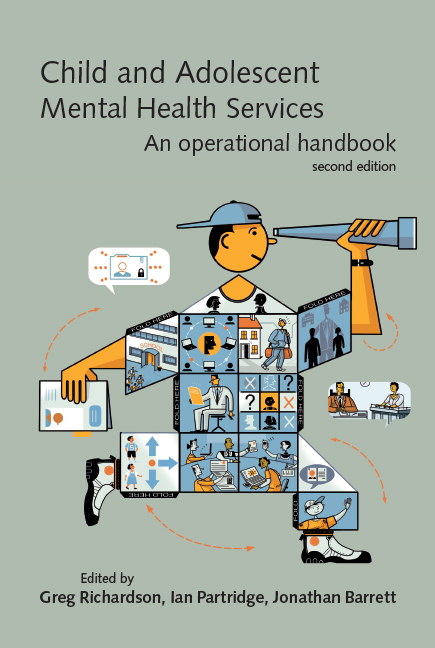Book contents
- Frontmatter
- Contents
- Tables, boxes and figures
- Contributors
- Abbreviations
- Preface
- 1 Introduction
- 2 CAMHS in context
- 3 CAMHS and the law
- 4 Structure, organisation and management of CAMHS
- 5 Evidence-based practice
- 6 Clinical governance
- 7 Education, supervision and workforce development
- 8 Multidisciplinary working
- 9 User and carer participation and advocacy
- 10 A comprehensive CAMHS
- 11 Referral management
- 12 Demand and capacity management
- 13 Strategies for working with Tier 1
- 14 Structuring and managing treatment options
- 15 CAMHS in the emergency department
- 16 Paediatric liaison
- 17 Self-harm
- 18 Learning disability services
- 19 Services for autism-spectrum disorders
- 20 Attentional problems services
- 21 Eating disorder teams
- 22 Bereavement services
- 23 CAMHS for refugees and recent immigrants
- 24 CAMHS and looked-after children
- 25 Drug and alcohol teams
- 26 Parenting risk assessment service
- 27 Court work
- 28 Tier 4 options
- 29 In-patient psychiatric care
- 30 Forensic services
- 31 Neuropsychiatry and neuropsychology services
- 32 Mental health provision for deaf children: study of a low-incidence service provision
- 33 Chief Executives – what do they want and how do they get it?
- Index
16 - Paediatric liaison
- Frontmatter
- Contents
- Tables, boxes and figures
- Contributors
- Abbreviations
- Preface
- 1 Introduction
- 2 CAMHS in context
- 3 CAMHS and the law
- 4 Structure, organisation and management of CAMHS
- 5 Evidence-based practice
- 6 Clinical governance
- 7 Education, supervision and workforce development
- 8 Multidisciplinary working
- 9 User and carer participation and advocacy
- 10 A comprehensive CAMHS
- 11 Referral management
- 12 Demand and capacity management
- 13 Strategies for working with Tier 1
- 14 Structuring and managing treatment options
- 15 CAMHS in the emergency department
- 16 Paediatric liaison
- 17 Self-harm
- 18 Learning disability services
- 19 Services for autism-spectrum disorders
- 20 Attentional problems services
- 21 Eating disorder teams
- 22 Bereavement services
- 23 CAMHS for refugees and recent immigrants
- 24 CAMHS and looked-after children
- 25 Drug and alcohol teams
- 26 Parenting risk assessment service
- 27 Court work
- 28 Tier 4 options
- 29 In-patient psychiatric care
- 30 Forensic services
- 31 Neuropsychiatry and neuropsychology services
- 32 Mental health provision for deaf children: study of a low-incidence service provision
- 33 Chief Executives – what do they want and how do they get it?
- Index
Summary
‘What is the matter with Mary Jane?
She's perfectly well and she hasn't a pain,
And it's lovely rice pudding for dinner again!
What is the matter with Mary Jane?’
A. A. MilneIntroduction
The first of the five outcomes in Every Child Matters (Department for Children, Schools and Families, 2003), a government aspirational document, is ‘Be healthy’ and clearly refers to ‘enjoying good physical and mental health’. These go hand in hand and services should be integrated to achieve these aspirations.
Children with mental health problems and psychiatric disorders or psychological morbidity frequently present in paediatric clinics and wards. Those with medical disorders have a higher incidence of mental disorders (Green et al, 2004; Hysing et al, 2007). These are sometimes not identified in paediatric services (Slowik & Noronha, 2004) and where they are, paediatricians rarely have the time or training to deal adequately with them (Garralda & Bailey, 1989). Without mental health provision and training, these children's needs will not be addressed. There are initiatives to address training by provision of mental health training specifically for paediatricians (www.rcpch.ac.uk/Education/Education-Courses-and- Programmes/Child-In-Mind) and this should also improve collaboration with paediatric colleagues. The opportunity for early intervention is crucial to prevent longer-term problems or unnecessary paediatric intervention and hospitalisations.
Despite evidence of need and effectiveness, most paediatric departments are still without any meaningful CAMHS input (Woodgate & Garralda, 2006), yet the most pressing need for CAMHS in general (Potter et al, 2005) is for precisely the cases that are found in hospital paediatric and child development departments: children with medical ill health, intellectual disabilities, developmental disorders, autism-spectrum disorders, selfharm, child abuse and comorbid cases. Between a quarter and a half of children in paediatric out-patient clinics have conditions in which psychological factors play a major role (Lask, 1994). Only a quarter of such children are likely to have received any CAMHS help (Glazebrook et al, 2003). The children's NSF recommended paediatric liaison (Department of Health, 2004), and the report on the implementation of Standard 9 of that NSF (Department of Health, 2006) outlines the need for CAMHS paediatric liaison as ‘an essential service for the ill child, siblings, parents and carers in cases where the presenting illness has a psychological component, or where psychological distress is caused as a result of the illness’.
- Type
- Chapter
- Information
- Child and Adolescent Mental Health ServicesAn Operational Handbook, pp. 151 - 161Publisher: Royal College of PsychiatristsFirst published in: 2017



